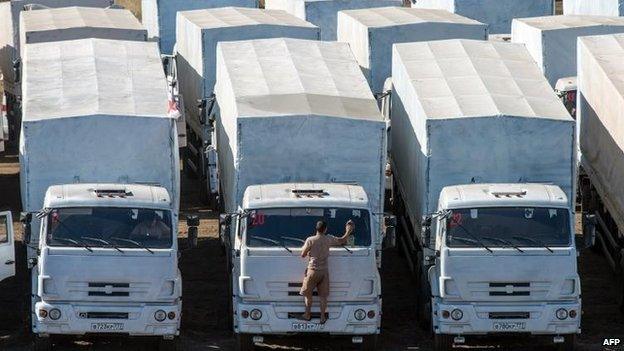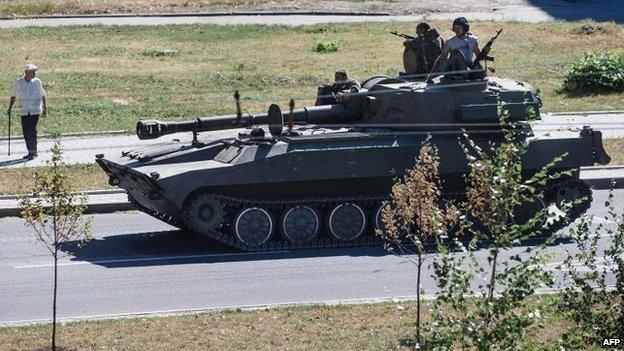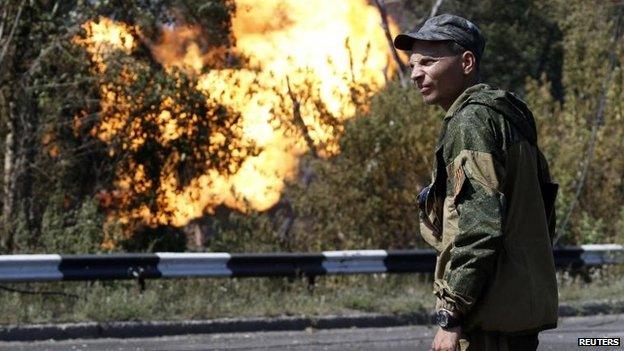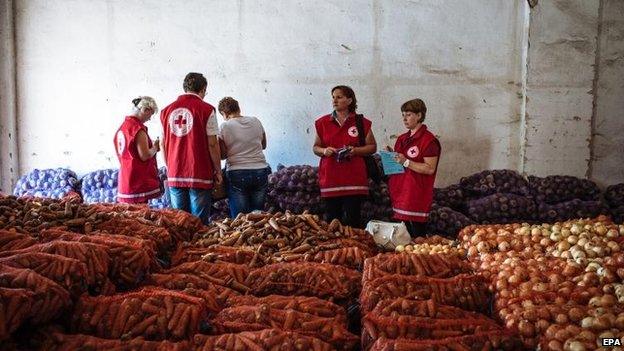Ukraine 'hits Russia armoured column' amid aid impasse
- Published
The BBC's Steve Rosenberg, who was given access to some of the Russian aid trucks, says many of them are "almost empty"
Ukraine says it has partially destroyed an armoured column crossing from Russia, as a controversial Russian aid convoy still waits at the border.
Nato said the column was a military "incursion", prompting the UK to summon Russia's envoy to explain.
Russia's defence ministry denied any such column had entered Ukraine.
Meanwhile Ukrainian border guards have arrived to inspect Russia's aid convoy, which was sent to help eastern Ukraine cities held by pro-Russian rebels.
Berlin meeting
The alleged incursion by Russian military vehicles into Ukraine was witnessed on Thursday by two UK newspaper reporters.
The BBC's Daniel Sandford in Moscow says the crossing was a reminder of the extent to which the Kremlin has been backing the rebellion in eastern Ukraine.
It is not known whether the troops moving with the military column were Russian or pro-Russian separatists.

The Russian aid convoy is still awaiting clearance

A pro-Russian militia tank moves along a street in Donetsk
Ukraine's President Petro Poroshenko said on his presidential website, external that he had discussed the incident with UK Prime Minister David Cameron.
Mr Poroshenko said the information was "trustworthy and confirmed because the majority of the machines had been eliminated by the Ukrainian artillery at night".
Andriy Lysenko, a spokesman for the Ukrainian military, added: "Appropriate actions were undertaken and a part of it no longer exists."
The UK Foreign Office summoned Russian Ambassador Alexander Yakovenko "to clarify reports of Russian military incursion".
Russia's defence ministry said the incursion reports were "some kind of fantasy".
It said: "There was no Russian military column that crossed the Russian-Ukrainian border either at night or during the day."
Nato Secretary General Anders Fogh Rasmussen said: "We see a continuous flow of weapons and fighters from Russia into eastern Ukraine, and it is a clear demonstration of continued Russian involvement in [its] destabilisation."
The Pentagon later said US Secretary of Defense Chuck Hagel had been assured by Russian counterpart Sergey Shoygu that there were no military personnel in the aid convoy.
Meanwhile Ukraine's Foreign Minister Pavlo Klimkin sent out a tweet saying he would be meeting Russia's Sergei Lavrov in Berlin on Sunday, along with their French and German counterparts, adding: "We need to talk."
Later, EU foreign ministers meeting in Brussels issued a statement saying, external: "Any unilateral military actions on the part of the Russian Federation in Ukraine under any pretext, including humanitarian, will be considered by the European Union as a blatant violation of international law."
'Likely to take time'
Russia's government has consistently denied directly arming or training the rebels.
On Friday Russia's foreign ministry issued a statement saying: "We draw attention to the sharp intensification of military action by Ukrainian forces with the apparent aim to stop the path, agreed on with Kiev, of a humanitarian convoy across the Russia-Ukraine border."

A pro-Russian rebel looks on as a gas pipeline is ruptured by shelling in Donetsk

The Red Cross checks a second aid convoy - sent by Ukraine - for cities in the east
Ukrainian border guards have yet to inspect the aid convoy.
Mr Lysenko told Ukrainian TV that the inspectors were still waiting for the relevant paperwork from the International Committee of the Red Cross (ICRC).
The BBC's Steve Rosenberg, who has been following the convoy, says some of the lorries were opened up for the media on Friday, and the main thing that struck him was how empty many of the vehicles were.
The ICRC's Head of Operations for Europe and Central Asia, Laurent Corbaz, said: "The agreement... foresees that the trucks will be checked by the customs officers of Ukraine on Russian territory and then be allowed inside Ukraine with ICRC people accompanying the convoy and then unload somewhere in Luhansk and go back to Russia, empty."
He said that given the size of the cargo and the security constraints, "implementation is likely to take some time", not in one week and possibly "much longer".
The conflict in Ukraine's east, which has claimed more than 2,000 lives, has intensified in recent weeks.
The violence began when pro-Russian rebels seized government buildings and tried to declare independence.
The Ukrainian military launched an operation to retake the region and stepped up its activities in June.
